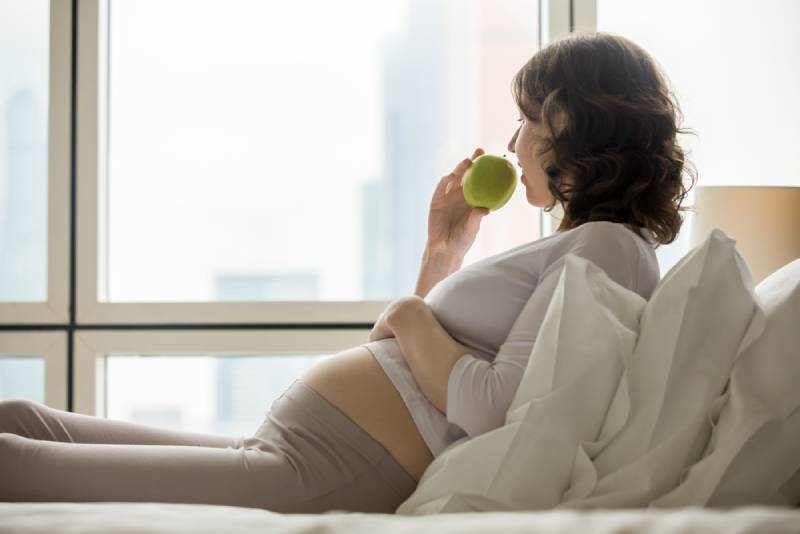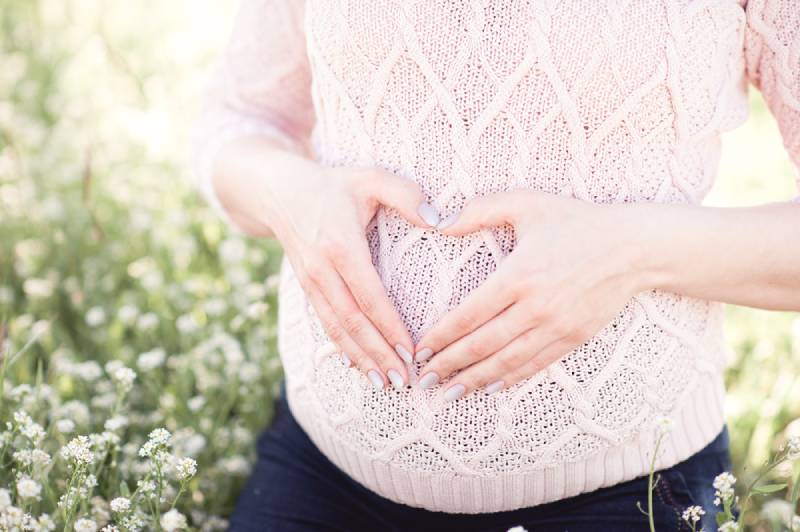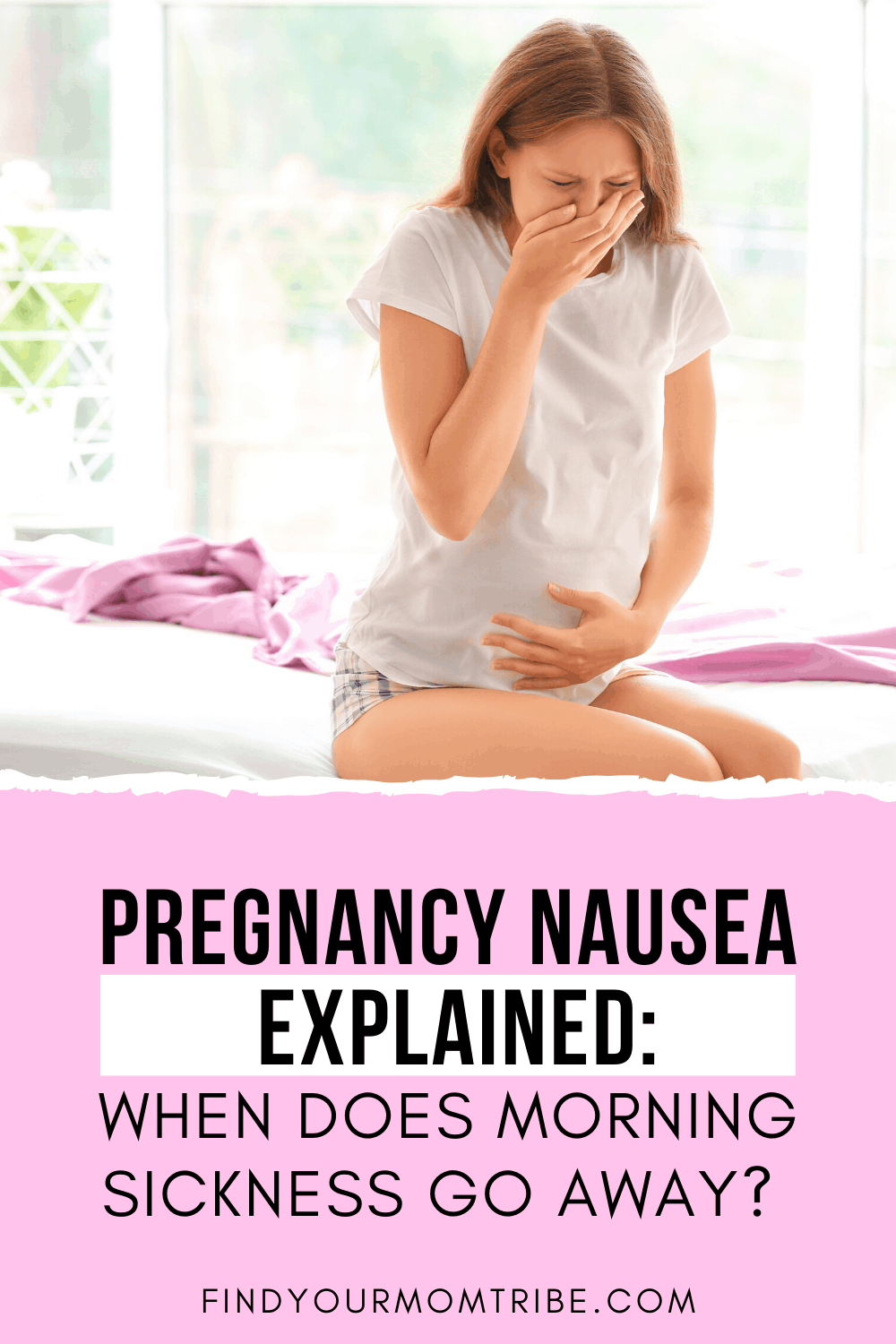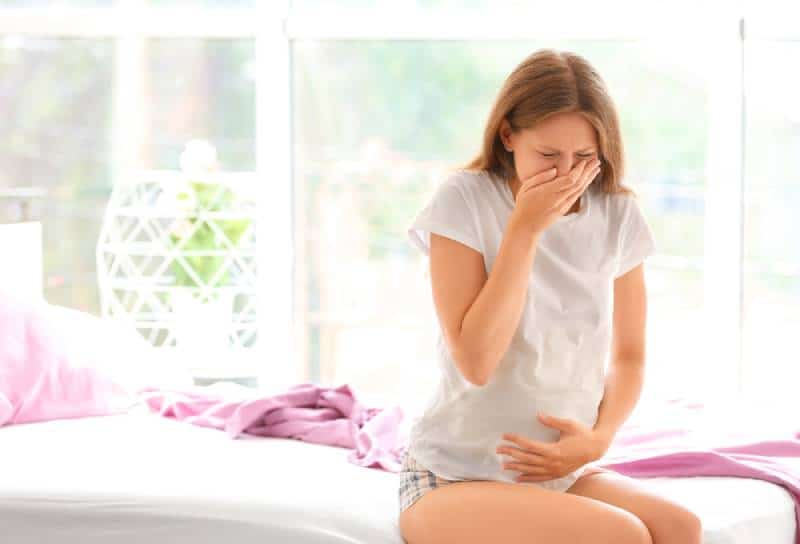If you’re in your first trimester and have been hugging your toilet bowl quite frequently, and even the sight of some food can send you running for the bathroom, you’re probably wondering when your morning sickness will go away.
Morning sickness is one of the most common symptoms of pregnancy, with most medical professionals agreeing that it affects around 70 percent of women.
This means that an overwhelming majority of moms-to-be will experience it in some way – whether it be through occasional nausea or full-on vomiting.
And for a very small percentage of women, their sickness will develop into a much more severe form called hyperemesis gravidarum, which can even require hospitalization.
But if you’re lucky enough to be part of the group whose symptoms are quite mild, then I have good news for you – the answer to “When does morning sickness go away?” is, “Sooner than you think!”
Morning sickness symptoms

While the name morning sickness (also known as nausea and vomiting of pregnancy) may seem self-explanatory in terms of its symptoms, it doesn’t necessarily have to occur only in the morning.
In fact, many pregnant women feel nauseous and experience symptoms of morning sickness, which can also include throwing up, throughout the day.
To make matters worse, sometimes nausea and vomiting aren’t triggered by anything in particular, although many women find that there are certain smells and foods that send them running to the toilet.
This is partly due to another pregnancy symptom – a heightened sense of smell, which can give you the uncanny ability to detect smells that you would never have noticed pre-pregnancy.
Maybe you were a big fan of spicy food prior to becoming pregnant but now can’t stand the sight of your favorite salsa dip?

Having an aversion to foods you loved isn’t unusual, so this should be expected, too.
Some women also get sick right after having a meal, which can get especially frustrating as moms want to eat well and get all the necessary vitamins for the development of their baby.
Apart from nausea triggered by food and smells, women experience motion sickness when riding in a car, bus, or boat, for example, which can become very inconvenient – especially when a woman relies on public transportation to get to work.
Then there are women who can be triggered by humidity in the air and flashing lights, as well as those for whom loud noises are a very strong trigger.
As you can see, different sensory experiences can kick off a nauseous episode for a pregnant lady – and this can occur at any time, even at night!
Why do we have morning sickness?
Believe it or not, doctors still aren’t 100 percent sure about what causes nausea during pregnancy, although they have a pretty good idea of who the main culprit is.
As always, we can blame it on the pregnancy hormones that run rampant while your little one is growing inside you, but there is one hormone in particular that doctors are quite certain causes nausea.
This hormone is called human chorionic gonadotropin (hCG), which the body produces at very high levels in the early pregnancy stages (more specifically, the first trimester).
It’s also known as the “pregnancy hormone” because when you take a home pregnancy test, it detects the presence of hCG in your urine and can tell you if you’re carrying a baby or not.
Between the 8th and 11th week of your pregnancy, you can expect this hormone to be at its highest level, which is incidentally the time when most women experience their worst symptoms.
Apart from hCG, there are other factors that can increase the severity of your symptoms, such as having low blood sugar and traveling a lot.
Being under a lot of stress and not getting enough sleep and rest can also worsen your symptoms, so it’s important to take care of your emotional wellbeing during pregnancy, too.

Another hormone that might be the cause of morning sickness is estrogen, which is much higher in women who are pregnant than in women who aren’t.
Then there is progesterone, which is another hormone that rises during pregnancy. It’s responsible for relaxing the muscles surrounding the womb, meaning that it can also have an impact on digestion and feeling sick.
That being said, some women are at a higher risk of developing morning sickness than others.
For example, if you experienced it during a previous pregnancy, you’re likely to have it again.
There are also women who are particularly sensitive and get motion sickness when riding in a car, for example, even when they’re not pregnant, so this group is particularly at risk from pregnancy nausea.
Interestingly enough, some researchers suggest that this is the way our bodies have evolved to protect both the mom and baby, albeit in a slightly roundabout way.
As food poisoning could be particularly dangerous to a pregnant woman, the body responds with nausea and vomiting to foods that are susceptible to being contaminated – even though they might be perfectly good to eat.
When does morning sickness go away?
As of one the best known pregnancy symptoms, the majority of moms-to-be are well prepared for when their bout of morning sickness hits them, so there is no element of surprise there!
Still, it helps to know how long morning sickness lasts and when it will, for lack of a better word, go away.
If you have just discovered that you’re carrying a baby, you can look forward to beginning to feel nauseous around the 6th week. But answering “When does morning sickness end?” is where things get a bit more complex.
Unfortunately, morning sickness doesn’t go away within a couple of days but it persists for weeks. You can expect to see symptoms slowly going away by the time you’re three or four months pregnant.
A smaller percentage of women, however, continue feeling sick into their second trimester, as well. Even though this is a rarer occurrence, it doesn’t mean that something is wrong with you or your little one.
Every pregnancy is unique, so don’t panic if you find yourself feeling nauseous well into your second trimester! This is even more common if you are carrying twins or triplets, so the answer to “When does morning sickness go away?” can depend on many factors.

For some women, morning sickness makes a comeback in the later months of pregnancy after a few relatively quiet months. When this happens, many moms-to-be begin panicking and think something must be wrong with them.
The good news is, having a bout of nausea in the last few months of your pregnancy is usually normal and doesn’t indicate a health issue.
Most of the time, it’s caused by the baby, who is big enough at this point to really put a lot of pressure on your gastrointestinal system and make it harder for your stomach to digest food.
Another reason lies in the muscles of your stomach, which are beginning to relax and making digestion more difficult. Eating food that is heavy on the stomach can also lead to feeling sick late into your pregnancy.
However, I should mention that persistent nausea in the last trimester can indicate a serious health issue such as pre-eclampsia, as one of its symptoms is nausea.
But this is not the only symptom of this health condition, as it is also followed by strong headaches, gaining a lot of weight, heartburn, and swelling of the hands, face, feet, and ankles.
It’s not uncommon for women with pre-eclampsia to experience pain in the area under their ribs, in addition to suddenly having problems with their vision.
Most of the time, though, preeclampsia is diagnosed by your doctor or healthcare provider during your prenatal appointments, so it won’t go unnoticed or without medical treatment!
When to talk to a healthcare provider
Morning sickness is extremely common and as such, doesn’t present a particularly dangerous risk to your health and is more of an annoying inconvenience you need to power through for a couple of weeks until things go back to normal.
That said, there are certain symptoms to look out for that are an indication that you need to talk to your doctor about possible treatments.
The first sign that something is not going according to plan is weight loss and constant vomiting to the extent that you can’t keep any food down.

Other signs also include:
- Running a fever
- Throwing up blood
- Vaginal bleeding or spotting
- Pain in the abdominal area
- Feeling dizzy and lightheaded
- Headaches that keep coming back
Above all, listen to what your body is telling you and don’t let anyone convince you that you’re “overreacting” and that it’s just a bit of nausea that you should endure.
A visit to the doctor’s office never hurt anyone, and knowing that everything is okay will give you the peace of mind you need during this important period.
SEE ALSO: Why Am I Throwing Up Yellow Vomit During Pregnancy?
Severe morning sickness (hyperemesis gravidarum)
Hyperemesis gravidarum, or severe nausea, affects only a tiny percentage of all women who experience nausea and vomiting during their pregnancy.
This condition is so severe that it can cause dehydration or significant weight loss but there is no official test that can be done to establish for certain that a woman has hyperemesis.
Your healthcare provider will take a look at all your symptoms and decide if a diagnosis can be made, and what your course of treatment should be.
In addition to excessive vomiting on a daily basis, other symptoms of hyperemesis include exhaustion to the point where you are unable to perform your day-to-day activities.

Confusion can set in, as well.
Your pulse might be faster than usual and your breath might smell differently, too.
When the condition is severe enough, a woman will be admitted to the hospital where she can be properly taken care of until the symptoms subside.
And while hyperemesis is treatable, women who have it in one pregnancy are very likely to have it again, which can have a big effect on their decision to have more children in the future.
How to treat morning sickness
While the answer to “When does the morning sickness go away?” can definitely vary from woman to woman, generally speaking, there are numerous treatment options to pursue (that include natural remedies as well) that work fast.
Naturally, you should never self-medicate. Instead, speak to your doctor first about what your options are, so you don’t make a potentially dangerous decision.
Your first priority, of course, is to get plenty of rest but we all know that with work obligations and the business of everyday life, this is not always possible.
But during weekends, for example, you can spend the day lounging in bed and enlist some of your family members to maybe help you with the things that need to be done at home.
Change your diet to more bland food, such as dry toast, that won’t cause you to dry heave. Bananas are also a good choice, in addition to ginger ale and ginger tea.

If you’re used to eating bigger meals during the day, now is the time to portion them into small meals, so you eat more frequently (6 smaller meals will do), and continue taking your prenatal vitamins, as well.
Fatty foods and food that has an intense smell, or is very spicy, should be avoided during this time as it can make your symptoms worse.
Of course, it goes without saying that fast food is a no-go.
And if you’re still struggling with your symptoms even after dietary changes, talk to your doctor about starting vitamin b6 supplements.
Here’s another handy tip – since you never know when the urge to throw up will come around, it’s best to keep a couple of disposable plastic bags on you whenever you leave the house.
Some companies even sell specialized bags made for pregnant ladies, but even a regular one will do the trick and save you from trying to find the nearest bathroom in a panic.
SEE ALSO: The Benefits And Risks Of Acupuncture In Pregnancy
I’m pregnant and don’t feel sick – should I be worried?
The second worst thing to feeling constantly nauseous during your pregnancy is probably not feeling nauseous at all.
While this might sound like winning the jackpot to some people, all the anxieties that come with pregnancy only get worse if one of its key symptoms seems to be missing.
So, if you’re not feeling sick, what could it mean?
First off, it doesn’t have to mean anything – even though a vast majority of women experience nausea, there is still a significant portion of lucky ones who don’t.

Some ladies might completely skip feeling sick in one pregnancy, only to be faced with bad vomiting episodes in the next one or the other way around.
For a small group of women, the absence of nausea is an indication that they’re at the risk of miscarrying but this is something that your doctor will check during your prenatal appointments, so there’s no need to worry about the safety of your little one!
Another common myth surrounding women who don’t feel sick during their pregnancy is that they’re carrying boys but this has never been backed by any scientific evidence and is a pretty bad indicator of the gender of your baby.
To wrap up
As you embark on your 9-month pregnancy journey, there will be plenty of discomfort that naturally accompanies this beautiful experience.
And for some women, it will be smoother sailing than for others.
When morning sickness goes away will depend on a lot of things, including how sensitive your body is to change – women who generally tend to get queasy during long drives are more susceptible to experiencing nausea in pregnancy, for example.
But rest assured that, sooner or later, it will be over and you won’t have to carry around plastic bags in your purse anymore!
READ NEXT: Why Food Aversions Happen During Pregnancy And How To Deal With Them
Like this post? Please share or pin it for later. You can also stay in the loop and follow us on Facebook, Instagram or Pinterest.

This post contains affiliate links. Please see our full disclosure for more info.

